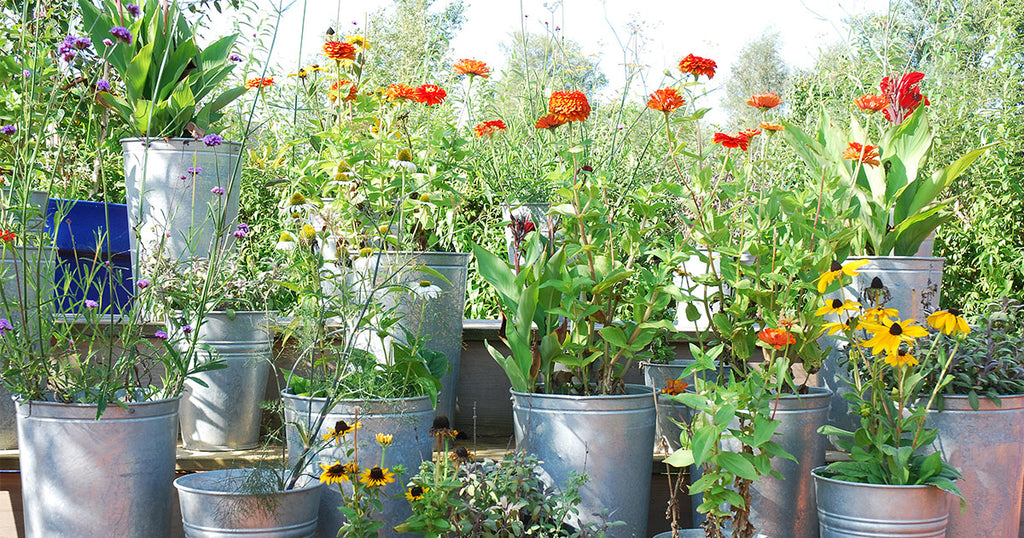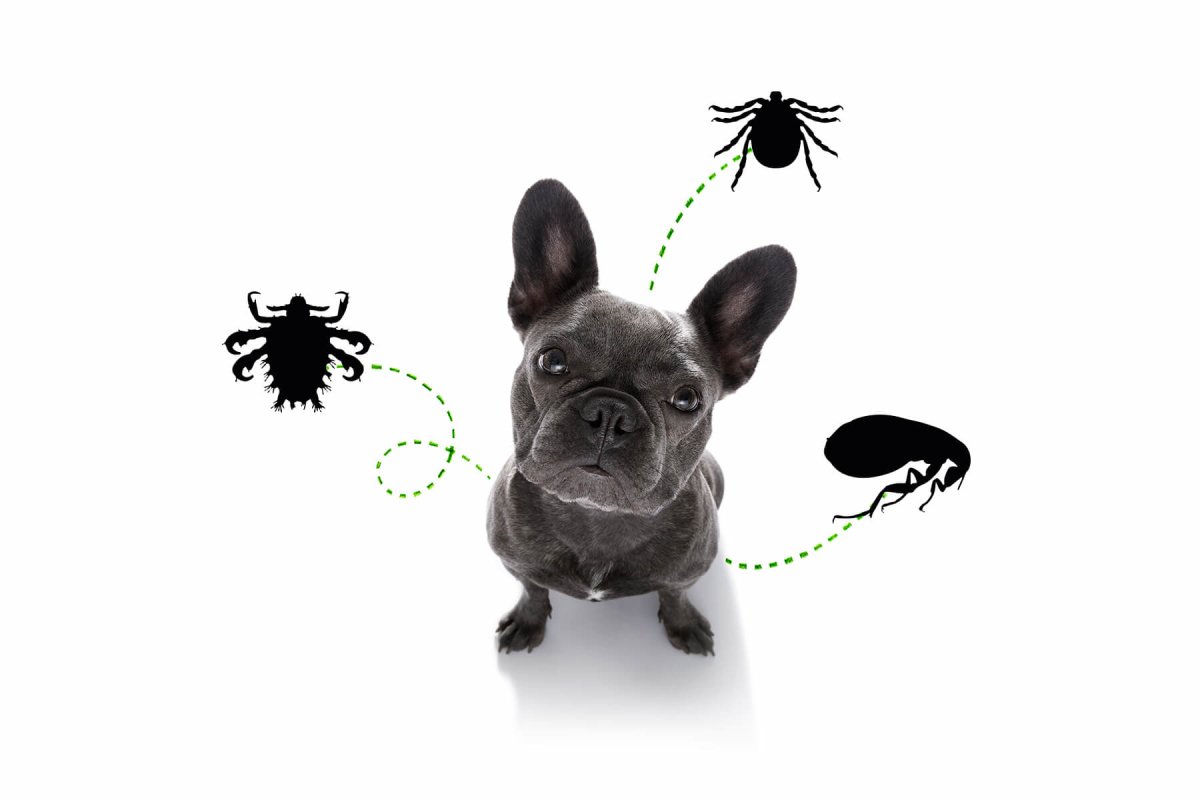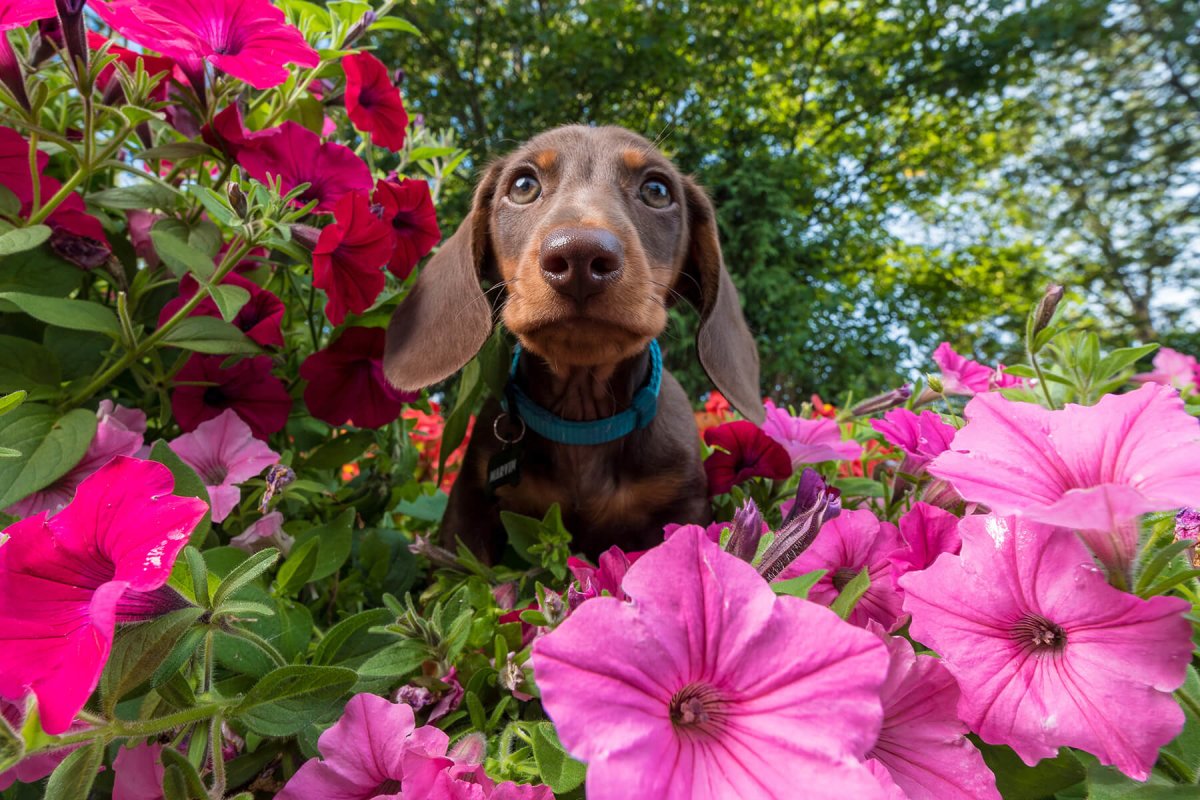In our last article, we introduced you to some poisonous garden plants that can cause considerable damage to your four-legged friend's health. So that your garden or patio doesn't remain desolate in spring, today we're introducing you to popular balcony and garden plants that are completely non-toxic and healthy for you and your pet. These primarily include herbs and roots, but also many colorful non-toxic flowers for dogs, cats and co. Find out below which herbs are healthy for your four-legged friend and which flowers you don't need to worry about.
Healthy herbs for animals - medicinal plants for the immune system and well-being
Herbs are not only healthy for us humans, but also for your dog, cat and, of course, your guinea pig. They contain many valuable vitamins, minerals and secondary plant substances. Some have also been used in medicine for centuries and have a healing effect on various ailments and diseases. These medicinal herbs can strengthen the immune system, have an anti-inflammatory effect and detoxify your four-legged friend's body. So you can use purely natural spices, roots or shrubs to boost your dog's nutritional balance and treat one or two of your cat's ailments. However, if your pet is pregnant or lactating, or has a chronic illness, you should always consult your trusted vet before adding herbs to their diet. As with humans, animals also have different requirements during this sensitive phase.

Basil
Basil is one of the most popular culinary herbs and can also be practically cultivated on the windowsill. It is used for pasta dishes but also finds its way into salads and pesto. In addition to its spicy aroma, basil has numerous health-promoting properties, including for animals. A paste made from freshly grated basil is a natural instant remedy for insect bites. The herb relieves your dog's swelling and pain and also has an anti-inflammatory effect.
Basil has the following effects:
- digestive
- antibacterial
- anti-inflammatory
- analgesic
- decongestant
Caution: Cats should only be given a small amount of basil occasionally. If the cat eats too much of it, vomiting can occur - as with the consumption of all plants and herbs. However, basil does not pose a risk to your cat's health.
Parsley
Like basil, parsley is one of the garden herbs most commonly used in the kitchen. However, it is much more than just a simple kitchen spice: parsley is a natural diuretic and has a diuretic and diuretic effect in dogs and cats. It can therefore be used to treat your four-legged friend's bladder and kidney inflammation. The robust plant can also have a relaxing effect on muscle tension after long walks.
Parsley has an
- antibacterial
- antispasmodic
- dehydrating
- diuretic
- invigorating
Caution: The dose is crucial with this herb. Larger dogs should not be fed more than one teaspoon of parsley a day, small dogs correspondingly less. Cats and rodents should also not be fed more than half a teaspoon. If your pet is prone to calcium oxalate stones, you should avoid feeding it parsley. This is because parsley contains a lot of oxalate and can therefore have a negative effect on your pet's health.
Thyme
The herbaceous thyme bush is an ancient medicinal and aromatic plant that is mainly used for respiratory diseases and gastrointestinal complaints. Freshly brewed thyme tea can help your pet, especially with coughs and pharyngitis, but can also have an expectorant effect. The medicinal herb can also provide relief for gastrointestinal complaints. The essential oils contained in the plant also have a disinfectant effect.
Thyme has the following effects
- appetizing
- anthelmintic
- disinfectant
- antibacterial
- antiviral
Caution: Thyme is not without its risks. Animals with liver and kidney disease should not be given thyme in their bowl. This is because the ingredient thymol is an essential oil and can lead to a worsening of the symptoms.
Camomile
Chamomile belongs to the daisy family and is a well-known medicinal plant. It is used for the gastrointestinal tract, but is also suitable for external applications: minor wounds, itching and insect bites are traditionally treated with the white-yellow flower. This is why products made from camomile are ideal for itch relief and ear care, such as our ear cleaner for dogs with natural camomile extracts.
Camomile has the following effects
- anti-inflammatory
- antispasmodic
- gentle on the stomach
- antibacterial
Caution: Chamomile can irritate the mucous membranes and trigger allergic reactions if used frequently.
Turmeric / Curcuma
Although the East Asian turmeric tuber is not a garden herb, it is nevertheless gaining ground in German gardens. The root is a traditional medicinal plant and is highly valued not only by botanists and healers. In the meantime, science has also taken up the healing tuber and published over 10,000 studies and papers on the health-promoting tuber. It is also being used more and more in veterinary medicine.
Turmeric has the following effects
- strongly anti-inflammatory
- digestive
- immunostimulating
- heals wounds
- stimulates the bile
- pain-relieving for arthritis
- anti-cancer
Caution: Turmeric has a blood-thinning effect and should not be fed before operations. If your four-legged friend is taking blood-thinning medication, you should also avoid feeding turmeric. Consultation with your vet is also required for all other medications. The tuber also has a choleretic effect, which can be problematic for animals with gallstones. However, turmeric is not suitable as a supplementary food for cats.
Mint
Mint enjoys a temperate climate and impresses with its intense menthol smell and taste. Many people come across mint in the form of toothpaste, especially in the morning and evening. But this popular garden herb also has health benefits for your pet. This is because mint is a tried and tested medicinal herb that is effective against stomach ache and alleviates cold symptoms.
Mint has the following effects
- aids digestion
- for flatulence
- against bad breath
- for stomach ache
- against tension
- for irritable bowel syndrome
- antibacterial
Caution: Mint should only be fed occasionally. Continuous administration can have a negative effect on the liver and kidneys. For dogs and cats with different illnesses, the feeding of mint should be discussed with the treating vet beforehand. Polei mint should not be fed at all, as it is unfortunately poisonous for our four-legged friends.
Rosehips
The bright red fruits are an eye-catcher in the fall and can also be cultivated in the garden. They are healthy and your pet benefits from the fruits due to their numerous ingredients such as vitamin C, flavonoids and, last but not least, galactolipids. Rosehips support your four-legged friend's immune system and have a positive effect on their musculoskeletal system. Rosehips are therefore mainly used to treat arthrosis, arthritis and other joint diseases. They can be dried, ground and mixed into your dog's or cat's food every day.
Rosehips have the following effects
- anti-inflammatory
- immunostimulating
- for arthrosis and arthritis
- pain-relieving
- diuretic
- antipyretic
Caution: Rosehip actually has hardly any side effects for your pet. However, dogs, cats and other animals with bladder weakness or kidney problems should not be fed rosehip. In addition, the daily dose should not exceed one teaspoon of rosehip powder for large dogs.
Barley grass
Barley grass is one of the modern superfoods and is often sold as a dietary supplement. Barley grass is particularly well known for its high chlorophyll content. It supplies your pet's blood with important oxygen and also contains a high proportion of calcium, magnesium and phosphorus. This has a positive effect on bone formation and muscles in dogs, cats and the like.
Barley grass has the following effects
- on the acid-base balance
- dehydrating
- alkalizing
- relaxing
- immunostimulating
Caution: Overdosing barley grass can lead to allergic reactions, digestive problems, nausea and vomiting. Therefore, make sure that your pet does not get more than ½ teaspoon of barley grass daily.
Non-toxic flowers for dogs and co. in the garden
In addition to the healing and tasty herbs, you can of course also add a bit of color to your garden. Many beautiful plants such as hydrangea, oleander and rhododendron are incompatible or even poisonous for your four-legged friend. Nevertheless, there are plenty of flowers that your dog or tiger can nibble on. After all, what would a garden or balcony be in spring without bright flowering plants? Below we list a few pet-friendly garden plants that will captivate you with their colorful flowers and are also a joy for your pet.

Lavender
This strongly aromatic Mediterranean plant is not only known to healers for its calming effect, but also adorns many gardens and balconies. However, there is a persistent rumor among cat owners that the plant is poisonous to their velvet paws. The all-clear has been given: lavender is safe for cats and dogs. Although regular administration can lead to liver problems in cats, lavender is harmless as a garden or balcony plant. As a rule, four-legged friends keep their distance from the medicinal plant anyway, as it has an extraordinarily strong aroma.
Hibiscus
The East Asian hibiscus, more commonly known as marshmallow, is also safe for animals. The domesticated species of marshmallow are particularly pet-friendly. Hibiscus has large, spreading flowers and is available as a houseplant, balcony plant or garden plant.
Tagetes
Tagetes, marigold, Turkish carnation or death flower is an easy-care plant with bright orange-red flowers. It flowers throughout the summer and is particularly popular in borders or as a balcony plant. What's more, pet owners can be completely relaxed with this flower. This relatively small but beautiful garden plant is completely non-toxic to dogs, cats and rodents. Some marigold flowers are also suitable for consumption.
Dahlias
No two dahlias are the same. There is hardly a plant species that differs as much within its genus as the dahlia. You may have noticed the fields of flowers along country roads or highways, most of these magnificent carpets of flowers are dahlias. These plants are also non-toxic to humans and animals and are even used to decorate food and drink.
Sunflowers
The proudly towering sunflowers are not only a beautiful sight in fields, gardens or on the patio, their seeds are also the raw material for the popular sunflower oil. But sunflower seeds are also a protein-rich food for animals, especially birds and rodents. The sunflowers, which can grow up to 2.50 m tall, can therefore also be used safely in the home garden or as a houseplant.
Conclusion
As you can see, there are plenty of garden and balcony plants that pose no danger to your four-legged friend and are a real eye-catcher. Pet-friendly plants such as lavender, hibiscus, marigolds, asters, dahlias or bright sunflowers bring color to your green oasis and are also completely safe for humans and animals. The occasional nibble from your dog will not cause any symptoms of poisoning and the plants are also easy to care for. But medicinal herbs can also bring your garden to life. Not only do they exude an intense aroma, they also have lots of healthy nutrients and have a healing effect on one or two of your four-legged friend's aches and pains. I hope we have been able to encourage you to occasionally mix healthy garden herbs into your dog's, cat's or rodent's food and, in the case of minor ailments, to first resort to the natural herbal cure from your own garden.





